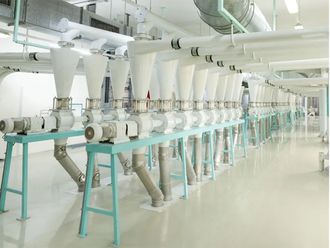Mumbai: Investor jitters over the US presidential election outcome sent Indian shares to four-month lows ahead of Tuesday’s vote, and the heightened risk to policies such as global trade and shifts in political stance should keep global markets on the edge in the coming week. The turbulence, however, would be an opportunity to grab bargains in an expanding economy.
The top-30 Sensex and the broader 50-share Nifty, both closely tracked by big overseas and domestic investors, skidded 2.4 per cent each in their biggest weekly fall in more than a month as foreign funds dumped shares worth more than $100 million. Opinion polls suggesting that maverick Republican candidate Donald Trump is closing the gap on Democratic nominee Hillary Clinton are likely to cause more unease among money managers.
“It will be very difficult to say what is going to happen but one thing is sure that there will be a huge rise in uncertainty across the globe in terms of what policies are now going to come out of the US,” Piyush Garg, chief investment officer at ICICI Securities Ltd told ET Now television channel. “So we could see a deep and a meaningful correction across global markets and my sense is that even we will not be spared.”
There is a feeling that export-driven sectors such as outsourcing and pharmaceuticals that get significant revenue from the US could face heavy weather if Washington tightens the flight of jobs and curtails imports. While Trump’s rhetoric on economic issues has been more extreme, Clinton has not been far behind either.
Foreigners were net sellers of $746 million of Indian stocks in October, halting seven consecutive months of inflows. Besides the election worries, the strong possibility of a US rate rise in December could see more outflows or a drastic slowdown in inflows as the year winds down.
Markets pundits say investors should look at shares of companies that are driven by domestic demand, which is picking up and would sustain as economic growth accelerates. The subcontinent’s massive market of 1.3 billion people, including a growing middle class of 300-400 million, provides a springboard for manufacturers and services providers.
In other words, a correction in share prices would be an opportunity to accumulate. “If we take a call for next six months, it is not so easy to say that at 2-3 per cent downward move, one should buy,” Garg said.
Factory activity in India expanded at its fastest pace in almost two years in October, riding a surge in output and new orders, a survey showed.
The Nikkei/Markit Manufacturing Purchasing Managers’ Index leapt to 54.4 in October, a 22-month high, from September’s 52.1. The PMI has stayed above the 50 level that separates growth from contraction for the tenth straight month.
“The sector looks to be building on the foundation of the implied pickup in growth in the previous quarter,” said Pollyanna De Lima, economist at survey compiler IHS Markit. An output subindex, which measures overall production, was at 57.2 in October, the highest since December 2012, and up sharply from 53.3 in September.
The US election is a passing phase and India is in a better position to weather global trade tightening. On the contrary, big multinational companies and funds are increasingly pouring cash into India to tap into the expanding domestic market.
FDIs rising
On Friday, for instance, the Japan’s Nikkei business daily reported that Suzuki Motor Corp would invest about $970 million in a second vehicle production line at its new plant in Gujarat. India is the biggest market for the Japanese car maker and its unit, Maruti Suzuki India Ltd, is already investing $2.8 billion for Gujarat to set up six production lines capable of producing 250,000 vehicles each.
APG Asset Management, a Dutch pension fund, and Rothschild family-backed investment firm The Xander Group are together investing $450 million in retail assets in India, where consumer spending is projected to top $3.6 trillion by 2020.
The two firms said on Friday they bought three shopping centres, totalling about 3.5 million square feet, for $300 million, in Bengaluru and Chennai in southern India, and Surat in the west. The remaining $150 million will be used to buy, or build new retail real estate assets.
Canada’s second-biggest pension fund, CDPQ, has partnered with local financial services firm Edelweiss Group to invest up to $700 million over the next four years in stressed assets and private debt opportunities in India. CDPQ aims to hold 20 per cent stake in Edelweiss Asset Reconstruction Company, which purchases bad loans and has about $4.5 billion in assets under management.
Earlier, Canada’s Brookfield Asset Management Inc and the State Bank of India as well as ICICI Bank and private equity firm Apollo Global Management LLC had announced similar tie-ups.
GST set to roll
Another development that fund managers and brokerages are focusing on is the Goods and Services Tax (GST), touted as the biggest overhaul in 70 years that aims to replace multiple levies that each state and municipal corporations impose with one uniform tax across the country.
A council comprising Finance Minister Arun Jaitley and his counterparts in each state reached an agreement on four rates at which products and services would be taxed, setting the stage for the roll out from April 1, 2017. The rates range from 5 to 28 per cent, with 12 per cent and 18 per cent as standard rates.
“There will be a zero tax rate in which several items which approximately constitutes 50 per cent of CPI (consumer price index) basket will be included and it was decided food grains used by common people will be included,” Jaitley said at news conference. “It is zero rate because its impact in terms of the inflationary pressure on common people is the least.”
He said that when the GST is fully implemented it would expand gross domestic product growth by two percentage points.
Though the government is yet to spell out what commodity would fall under each category, brokerages said companies such as Hindustan Unilever, Godrej Consumer Products and Colgate-Palmolive would be beneficiaries. This is because the tax rate on items of mass consumption such as soaps, hair oils and toothpaste which is currently at 25-28 per cent could drop.
“We see a very strong possibility of toothpaste being in the 18 per cent rate slab,” Credit Suisse said in a note, upgrading Colgate to “outperform” from “neutral”. It also raised its earnings estimates for 2017-18 and 2018-19 by 3-6 per cent and lifted the target price for the stock to Rs. 1,150 from Rs. 1,000.
“The stock has underperformed peers, being flat year-on-year, which should now start reversing,” the brokerage said.
The BSE index for fast moving consumer goods pared nearly all its weekly losses, while the Sensex fell more than 2 per cent.
Major competitors Dabur and Patanjali will not benefit as much because they enjoy exemptions, while Colgate’s manufacturing units pay 25-26 per cent indirect taxes currently.
Diversified ITC Ltd, the country’s biggest cigarette maker, is also seen to benefit as the 28 per cent rate is the same as it currently pays, though there could be a cess on top of this. Credit Suisse and JP Morgan said they both maintained their “overweight” stance on the stock.
“The government has promised the states that it would bridge any revenue shortfall due to the GST, based on a 14 per cent annual rise in tax revenues. If the shortfall is higher, the cess on select items, including tobacco, will be raised,” JP Morgan said.
— The author is a journalist based in India












